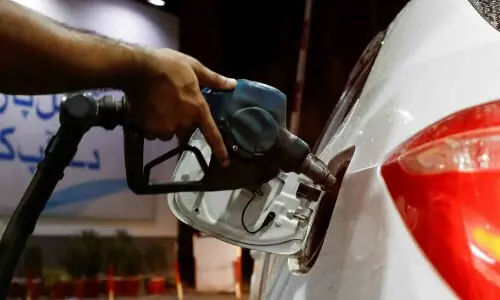ISLAMABAD: The Executive Board of the International Monetary Fund (IMF) is tentatively scheduled for Dec 7 to approve the Staff-Level Agreement (SLA) with Pakistan for the first review of the $3bn Stand-By Arrangement (SBA) leading to disbursement of about $700 million on Dec 8.
The IMF staff and the Pakistani authorities reached the SLA on Nov 15 in Islamabad, according to an end-of-mission statement. This will enable Pakistan to have access to SDR 528 million (around $700m). This will bring total disbursements under the nine-month $3bn SBA to almost $1.9bn.
A day later, Caretaker Finance Minister Dr Shamshad Akhtar announced shelving a $1.5bn Eurobond launch because of adverse global financial conditions and committed to keep regularly adjusting electricity and gas rates to avoid further flow of circular debt.
The IMF mission had called upon the authorities to return to the market-determined exchange rate and had highlighted risks that may arise because of geopolitical tensions, rise in commodity prices and difficult global financial conditions and advised the authorities to continue efforts to build resilience.
Pakistan likely to receive $700m tranche next day
It also pointed out that timely disbursement of committed external support remains critical to support the authorities’ policy and reform efforts as the government was accelerating engagement with multilateral and official bilateral partners.
This was after a long time that a quarterly review with the fund remained smooth and culminated in the immediate announcement of an SLA as most of the quantitative targets had been complied with. The talks spanned over almost two weeks (Nov 2-15) in Islamabad. The SBA was signed in July this year with an upfront disbursement of about $1.2bn.
The fund statement said the agreement supported Pakistan’s commitment to advance the planned fiscal consolidation, accelerate cost-reducing reforms in the energy sector, complete the return to a market-determined exchange rate, and pursue state-owned enterprise and governance reforms to attract investment and support job creation while continuing to strengthen social assistance.
It noted that anchored by the stabilisation policies under the SBA, a nascent recovery was underway, buoyed by international partners’ support and signs of improved confidence. The steadfast execution of the FY24 budget, continued adjustment of energy prices, and renewed flows into the foreign exchange (FX) market have lessened fiscal and external pressures.
The fund said inflation was expected to decelerate over the coming months amid receding supply constraints and modest demand. “However, Pakistan remains susceptible to significant external risks, including the intensification of geopolitical tensions, resurgent commodity prices, and the further tightening in global financial conditions.
The IMF reiterated that strengthening macroeconomic sustainability and laying the conditions for balanced growth were key priorities under the SBA and insisting on continued fiscal consolidation to reduce public debt, while protecting development needs. It appreciated that authorities were determined to achieve a primary surplus of at least 0.4pc of GDP in FY24, underpinned by federal and provincial government spending restraint and improved revenue performance supported, if necessary, by contingent measures.
The two sides also agreed on further reforms to reduce costs in the energy sector and restore its viability. With the combined circular debt across power and gas sectors exceeding 4pc of GDP, immediate action was critical that included power tariff adjustments pending since July 2023 and increased gas prices after a long time, effective Nov 1, 2023.
The IMF conceded that these tariff increases were “substantial” but were necessary to avoid further arrears that threatened the viability of these sectors and the provision of critical energy supplies. The authorities are also moving to tackle cost-side pressures, including bringing private sector participation to Discos, institutionalising recovery and anti-theft actions, improving Power Purchase Agreement (PPA) terms, and reducing the incentives for captive power.
The fund insisted on returning to a market-determined exchange rate at the earliest and rebuilding foreign exchange reserves. It noted that while inflows following increased regulatory and law enforcement helped normalise import and FX payments and rebuild reserves, the authorities recognise that the rupee must remain market-determined to sustainably alleviate external pressures and rebuild reserves.
Published in Dawn, November 21st, 2023
































